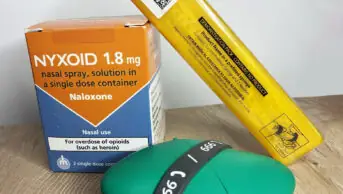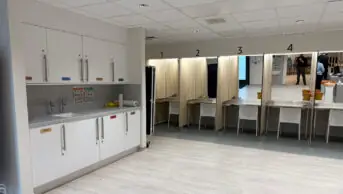
Felix Choo / Alamy Stock Photo
The Department of Health and Social Care (DHSC) will not be taking forward recommendations to set up a helpline to support patients struggling with prescribed drug dependence, The Pharmaceutical Journal has learned.
This follows the failure of a spending review bid for the helpline submitted to HM Treasury in September 2021, meeting minutes released through a Freedom of Information (FoI) request have revealed.
In 2019, Public Health England (PHE) — which has now been replaced by the UK Health Security Agency and the Office for Health Improvement and Disparities — published an evidence review on the dependence and withdrawal associated with some prescribed medicines.
It included a recommendation that the DHSC should look at introducing a “time-limited national helpline and associated website” to provide expert advice and support to patients.
The report said the service should provide patients with a combination of support and guidance in the form of drug information, advice on withdrawal and withdrawal symptoms, non-drug alternatives and details of local support services.
However, minutes from a meeting of the PHE Prescribed Medicines Review Oversight Group held in April 2022, obtained by The Pharmaceutical Journal via the FoI request, reveal that, owing to the failure of the spending review bid, the DHSC would “not be taking [the helpline] forward”.
Further information, in the form of a March 2022 PHE review recommendations update from NHS England and NHS Improvement (NHSE&I), seen by The Pharmaceutical Journal, said that DHSC policy officials would be working with NHSE&I and the oversight group to look at “alternative ways” to deliver the level of support intended by this recommendation.
Luke Montagu, an officer for the All-Party Parliamentary Group for Prescribed Drug Dependence (APPGPDD), who have made the case for the helpline for many years, said the news had been met with “deep disappointment”.
“This has been our priority area over the past few years.”
“[During] the first conversation that we had with Duncan Selbie [former chief executive of Public Health England] that led to the review, the presentation that we gave to him that persuaded him to do that whole review was called ‘the case for a helpline’ — that’s where it all started and we provided any amount of evidence in support of that then, we’ve got even more now, and so its profoundly frustrating that, out of all the recommendations that came out of that review, the helpline seems to be the one that has been kicked into the grass.”
Montagu said that as a result, patients and sufferers of prescribed drug dependence — many of whom are in crisis — would continue to have nowhere to turn.
“Some of them are killing themselves — there are suicides frequently as a result of this,” he added.
“[This is] the one recommendation that we knew was going to be the speediest intervention, because a helpline can be national immediately, in a way that all these other things take months and years to filter through, and it’s also incredibly cost effective, we have evidence from existing helplines that it [costs] pennies per head of the population.”
The spending review bid submitted by the DHSC was for £1.9m, according to the APPG, which Montagu described as a “tiny sum”.
“The moral imperative of the health service is to support people who have been harmed by taking drugs as prescribed by their doctors; there could be no higher priority than spending a tiny, tiny, sum of money to help support those people — it’s a scandal that it hasn’t happened.”
The British Medical Association (BMA) has been another significant voice in calls for a national helpline to support people with prescription drug addiction since 2016. David Strain, board of science chair at the BMA, said it was “incredibly disappointing” to hear that the government would not be taking the recommendation forward.
“Prescribed drug dependence is a major public health issue, and the BMA has repeatedly set out why a national helpline is needed, as well as a complementary website offering support and advice for carers and family members,” he said.
“There are existing helplines run by small charities and support groups in the UK, but they only cover a small proportion of the country and report significant demand.”
Strain said that the BMA had also called for dedicated referral services for those struggling with prescribed drug dependence, updated guidance on withdrawal management and the provision of alternatives to needing to prescribe in the first place.
“Asking for help with prescribed drug dependence is huge step, and there should be something in place for people to get the support they need, when they need it.
“To not even have access to a phone number is simply not good enough, and this missed opportunity to support that first step could result in an individual not achieving their withdrawal, potentially putting extra pressure on the NHS at a later stage.
“The government must urgently review this decision and ensure that those struggling with prescribed drug dependency are not forgotten.”
The Pharmaceutical Journal approached the DHSC for comment and a spokesperson said: “During spending reviews, we have to make difficult decisions to ensure we are making the largest possible impact on the health of patients with the available funding.
“The NHS is working on the implementation of other recommendations in Public Health England’s 2019 review on prescribed medicines, and we have developed a framework to support Integrated Care Boards on the important but complex issue of prescribed drugs dependence.”
- This article was updated on 18 July 2022 to include a comment from the Department of Health and Social Care
3 comments
You must be logged in to post a comment.



It is difficult to discern what a telephone help line would achieve for Rx drug addicts. It would have been no good for me, when I had a problem with prescription drugs. It’s difficult to get meaningful advice from a phone line , especially if the person in the other end has no idea of your circumstances. Once again it is people who have not been there dreaming up schemes for those who have. The BMA don’t want to support it because their members caused the problem in the first place and are unwilling to help. Even though I had a problem for 40 years and had fitness to practice issues, even I don’t know the answer. But I do know it’s not a phone line.
The idea of a helpline *has* come from those who have been through prescribed drug dependence and have struggled to get a) recognition of their withdrawal responses b) info on how to withdraw safely and c) support whilst doing so. A dedicated national helpline staffed by trained people could offer all of this.
Well, Bob, first off, people who have become physically dependent on a prescription medication is NOT an addict. There is a massive difference between addiction and physical dependency. Many people who become dependent have not been given informed consent by their doctors that dependency could occur. Many are left with absolutely no support (emotionally, financially, etc) and have no clue how to slowly and safely taper off their drugs because doctors are so incompetent they aren't educated on taper protocols. A helpline would help point these people in a direction of someone who can help them as well has offer emotionally support for having their lives destroyed by doctors who couldn't kindly inform them their medication could cause dependency. Many people end up physically dependent, NOT ADDICTED, and end up killing themselves because they have no clue how to taper and the drug has destroyed their nervous system. Many people physically dependent are going online to taper communities and forums to learn how to taper when it should be their doctors and governments job to help them, not complete strangers.